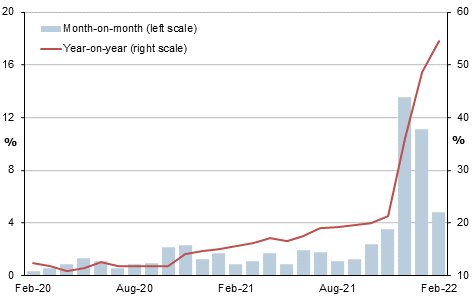In March, Turkish inflation reached a new two-decade high, making the lira increasingly vulnerable.
According to Bloomberg’s estimations, consumer prices rose an annual 61.1% last month.

The central bank’s pause for three months caused Turkey’s interest rates to become the lowest in the world.
With Turkey’s real rates at minus 47%, the lira has already come under pressure, staging the second worst performance after Russian ruble in emerging markets against the dollar in March.
The highest annual price increase last month was seen in transportation with 99.12%, followed by food and nonalcoholic beverages at 70.33% and furnishing and household equipment at 69.26%.
The lowest annual increases were posted by communication with 15.08%, education with 26.73%, and clothing and footwear with 26.95%.
Onur Ilgen, Head of the treasury at MUFG Bank Turkey in Istanbul, said, “Given the dramatic change in the macro outlook and financial conditions, we think the long-term sustainability of this policy framework will be less likely with inflation running above 60% and likely to remain high above 50% at least until last quarter”.
According to London-based Capital Economics, inflation will stay close to these high levels until the very final months of this year, “but the central bank and, crucially, President Erdogan seem to have no appetite for interest rate hikes”.
As President Recep Tayyip Erdogan’s goal is to use a cheaper lira to turn Turkey into a manufacturing power, the rate hikes aren’t on the agenda.
Declines in the currency, which has lost over 9% this year, are making imports more expensive.
The currency’s turbulence has hit Turks hard, as the value of their salaries dropped and living costs dramatically increased. Steep hikes in electricity and natural gas tariffs have compounded the pain for consumers and businesses.
After the data release on Monday, Nureddin Nebati, Treasury & Finance Minister, predicted that inflation would fall to “a reasonable level” by the end of the year, though he did not provide any specific details.
Ziad Daoud, Chief Economist on Emerging Markets, mentioned, that the inflation data highlights an alarming situation for Turkish Lira and Turkish economy. Simultaneously, an escalation of the war in Ukraine will hit the currency through rising import costs. On the other hand, the end of the war conflict is expected to bring pressure from higher global interest rates. The inability of the central bank to raise interest rates magnifies the risks for the national currency.
Stating that the world economy, which has been facing an extraordinary period due to the pandemic over the last two years, has been shaken once again by the Russia-Ukraine war, the finance minister of Turkey noted that the economic effects of the war, as well as its tragic individual and social effects, have affected the whole world.
The supply problems, especially in agricultural and energy products, increase the inflationary pressure on all the countries, including Turkey.
Sahap Kavcioglu, Governor of the Central Bank of Turkey, says that support for the local currency will be a key objective this year, though little sign has been shown that it will involve a tighter monetary policy stance.
The lira has fallen down 9.5% this year so far.
The central bank hopes to curb price growth by taking measures to encourage de-dollarization.
The highlights of the March inflation report published by Turkstat on Monday are below:
- Producer prices rose 9.2% in the month, bringing annual inflation to 115%.
- Elevated levels of factory-gate inflation are continuing to put upward pressure on consumer prices.
- Energy inflation climbed to 102.9% from 83% in February, driven by a surge in the cost of refined products and natural gas, despite tax cuts.
- Food prices, which make up roughly a quarter of the consumer basket, rose an annual 70.3%, up from 64.5%
With the central bank on the sidelines, Erdogan’s government is trying to contain prices by means of a new round of value-added tax cuts on some staple products, which will go into effect by April.
Though, according to Fatih Akcelik, Deutsche Bank AG economist, the inflationary pressures should be addressed via a monetary policy rather than minor fiscal adjustments.
Sources:
https://www.cnbc.com/2022/03/03/turkeys-inflation-rate-hits-a-new-20-year-high-of-54percent-.html
https://www.dailysabah.com/business/economy/turkeys-inflation-at-61-in-march-surpassing-estimations